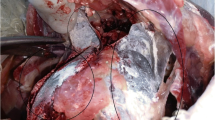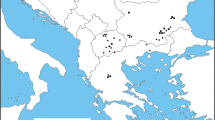Abstract
A bearded vulture (Gypaetus barbatus) found dead in northern Spain presented external lesions consistent with electrocution as the cause of death. During forensic examination, macroscopic lesions suggested potential comorbidity, so samples were collected for molecular and toxicological analyses. Gastric content and liver were analysed for toxic substances, and pentobarbital (a common pharmaceutical used for euthanasia in domestic animals) was detected at a concentration of 37.3 and 0.05 µg/g, respectively. Other toxicological, viral and endoparasite analyses (avian malaria, avian influenza and flaviviruses) were negative. Thus, although the cause of death was electrocution, pentobarbital intoxication likely impaired the equilibrium and reflexes of the individual, possibly causing the bird to contact energized wires that it would not have otherwise. These results underline the importance of comprehensive analysis of forensic cases of wildlife deaths and reveal barbiturate poisoning as an additional threat for the conservation of the bearded vulture in Europe.


Similar content being viewed by others
Data availability
Not applicable.
References
American Veterinary Medical Association (2020) AVMA Guidelines for Euthanasia of Animals. https://www.avma.org/sites/default/files/2020-02/Guidelines-on-Euthanasia-2020.pdf
Antor RJ, Margalida A, Heredia R (2004) Quebrantahuesos, Gypaetus barbatus. In: Madroño A, González C, Atienza JC (eds) Libro rojo de las Aves de España. Dirección General para la Biodiversidad-SEO/BirdLife, Madrid, p 124
Arnold KE, Boxall ABA, Brown AR, Cuthbert RJ, Gaw S, Hutchinson TH, Jobling S, Madde JC, Metclafe CD, Naidoo V, Shore RF, Smits JE, Taggart MA, Thompson HM (2013) Assessing the exposure risk and impacts of pharmaceuticals in the environment on individuals and ecosystems. Biol Lett 9:1–4. https://doi.org/10.1098/rsbl.2013.0492
BirdLife International (2023) Species factsheet: Gypaetus barbatus. http://www.birdlife.orgon16/01/2023
Cartiser N, Bévalot F, Fanton L, Gaillard Y, Guitton J (2011) State-of-the-art of bone marrow analysis in forensic toxicology: a review. Int J Legal Med 125:181–198. https://doi.org/10.1007/s00414-010-0525-6
Feltenstein MW, Warnick JE, Guth AN, Sufka KJ (2004) The chick separation stress paradigm: a validation study. Pharmacol Biochem Behav 77:221–226. https://doi.org/10.1016/j.pbb.2003.10.019
Herrero-Villar M, Sánchez-Barbudo IS, Camarero PR, Taggart MA, Mateo R (2021) Increasing incidence of barbiturate intoxication in avian scavengers and mammals in Spain. Environ Pollut 284:117452. https://doi.org/10.1016/j.envpol.2021.117452
Margalida A, Bertran J, Heredia R (2009) Diet and food preferences of the endangered bearded vulture Gypaetus barbatus: a basis for their conservation. Ibis 151:235–243. https://doi.org/10.1111/j.1474-919X.2008.00904.x
Margalida A, Martínez JM (2020) Resultados generales. In: Margalida A, Martínez JM (eds) El quebrantahuesos en España, población reproductora en 2018 y método de censo. Instituto de Investigación en Recursos Cinegéticos (CSIC-UCLM-JCCM). Ciudad Real, pp 20–21
Mateo R, Sánchez-Barbudo IS, Camarero PR, Martínez JM (2015) Risk assessment of bearded vulture (Gypaetus barbatus) exposure to topical antiparasitics used in livestock within an ecotoxicovigilance framework. Sci Tot Environ 536:704–712. https://doi.org/10.1016/j.scitotenv.2015.07.109
Moureau G, Temman S, Conzalez PJ, Charrel RN, Grard G, Lamballerie X (2007) A real- time RT-PCR method for the universal detection and identification of flaviviruses. Vector Borne Zoonotic Dis 7:467–477. https://doi.org/10.1089/vbz.2007.0206
Munster JV, Baas C, Lexmond P, Waldenström J, Wallensten A, Fransson T, Rimmelzwaan GF, Beyer WEP, Schutten M, Olsen B, Osterhaus ADM, Fouchier RAM (2007) Spatial, temporal, and species variation in prevalence of influenza a viruses in wild migratory birds. PLoS Pathog 3:e61. https://doi.org/10.1371/journal.ppat.0030061
Pain DJ, Bowden CG, Cunningham AA, Cuthbert R, Das D, Gilbert M, Jakati RD, Jhala Y, Khan AA, Naidoo V, Oaks JL (2008) The race to prevent the extinction of South Asian vultures. Bird Conserv Int 8(S1):S30–S48. https://doi.org/10.1017/S0959270908000324
Russell RE, Franson JC (2014) Causes of mortality in eagles submitted to the national wildlife health center 1975–2013. Wildl Soc Bull 38:697–704. https://doi.org/10.1002/wsb.469
Shore RF, Taggart MA, Smits J, Mateo R, Richards NL, Fryday S (2014) Detection and drivers of exposure and effects of pharmaceuticals in higher vertebrates. Philos Trans R Soc B 369:1–10. https://doi.org/10.1098/rstb.2013.0570
Viner TC, Hamlin BC, McClure PJ, Yates BC (2016) Integrating the Forensic Sciences in Wildlife Case Investigations: a Case Report of Pentobarbital and Phenytoin Toxicosis in a Bald Eagle (Haliaeetus leucocephalus). Vet Pathol 53:1103–1106. https://doi.org/10.1177/03009858166411
Waldenström J, Bensch S, Hasselquist D, Ostman O (2004) A new nested polymerase chain reaction method very efficient in detecting Plasmodium and Haemoproteus infections from avian blood. J Parasitol 90:191–194. https://doi.org/10.1645/GE-3221RN
Winek CL, Costantino AG, Wahba WW, Collom W (1985) Blood versus bone marrow pentobarbital concentrations. Forensic Sci Int 27:15–24. https://doi.org/10.1016/0379-0738(85)90100-8
Acknowledgements
Authors acknowledge Life Pro BV LIFE 20 NAT/ES/001363 financed by European Union LIFE program. Preliminary results were presented as an Abstract at the 24th Spanish Toxicology Congress, Córdoba, 9–11 November 2022. Authors acknowledge José Carlos González Ruiz and Javier Gil Vaquero from the FCQ for providing the pictures included in supplementary information and graphical abstract.
Funding
European Union LIFE program, Life Pro BV LIFE 20 NAT/ES/001363.
Author information
Authors and Affiliations
Contributions
Marta Herrero-Villar: Performed research, Analyzed data, Writing - Original Draft. Inés S. Sánchez-Barbudo: Performed research, Analyzed data. Teresa Cardona-Cabrera: Performed research, Analyzed data, Writing - Review and Editing. Ursula Höfle: Analyzed data, Conceived study, Writing - Review and Editing. Alberto Sánchez-Cano: Performed research, Analyzed data. Gerardo Baguena: Performed research, Project administration, Funding acquisition. Rafael Mateo: Analyzed data, Conceived study, Writing - Review and Editing. All the authors reviewed the manuscript.
Corresponding author
Ethics declarations
Ethical approval
Not applicable.
Competing interests
None of the authors of this paper has a financial or personal relationship with other people or organisations that could inappropriately influence or bias the content of the paper.
Additional information
Publisher’s note
Springer Nature remains neutral with regard to jurisdictional claims in published maps and institutional affiliations.
Electronic supplementary material
Below is the link to the electronic supplementary material.
Rights and permissions
Springer Nature or its licensor (e.g. a society or other partner) holds exclusive rights to this article under a publishing agreement with the author(s) or other rightsholder(s); author self-archiving of the accepted manuscript version of this article is solely governed by the terms of such publishing agreement and applicable law.
About this article
Cite this article
Herrero-Villar, M., Sánchez-Barbudo, I., Cardona-Cabrera, T. et al. Pentobarbital intoxication as a potential underlying cause for electrocution in a bearded vulture. Vet Res Commun 47, 2265–2269 (2023). https://doi.org/10.1007/s11259-023-10093-2
Received:
Accepted:
Published:
Issue Date:
DOI: https://doi.org/10.1007/s11259-023-10093-2




